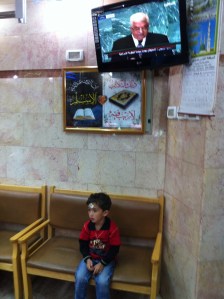
Palestinians hold a flag and throw stones in front of a mural depicting Yasser Arafat on the controversial Israeli barrier, during clashes with Israeli troops at Qalandiya checkpoint, near the West bank city of Ramallah September 23, 2011.
At one end of Ramallah, Israeli riot police line up behind barricades, stubby tear gas rifles leveled at shoulder height toward the few dozen young Palestinian men who reliably emerge from the Qalandia refugee camp when Israeli soldiers emerge from the checkpoint of the same name two blocks away. Camera crews set up between them, and traffic surrenders the southbound lane to the ragged ritual of charge and chase. Ambulances idle a block out of range.
In the center of the city, several thousand residents gather to watch the occasion for the conflict. Mahmoud Abbas, the snowy-haired, grandfatherly successor to Yasser Arafat, was scheduled to address the United Nations General Assembly, formally submitting the application for Palestinian statehood. It’s a historic, widely anticipated event that, in Ramallah, lost some of its starch in the previous 48 hours, when President Obama delivered a speech so weighted toward the Israeli view of the conflict that Abu Mazen, as Abbas is widely known, watched it with his head in his hands.
“Curse the father of Obama,” says Anward Al-Kurdi, 45, in the doorway of the downtown Red Rose flower shop. “Abu Mazen’s in a very tight spot now. He has to do what he said he was going to do or he’s going to have all these people spitting on him. Honestly, they’ll go after him.”
(SEE: Photos of the latest clashes in the West Bank.)
Around the corner, in The People’s Butcher, a middle-aged man with a full beard shrugged. “Nothing new,” says Mohammed Alqam, better known as Abu Azmi. “Honestly, all we want is peace.”
He owns the tidy, gleaming shop, offering freshly killed sheep and goat, sometimes beef. “I don’t see any hope,” he says, at 43. “I don’t see any potential for the Palestinian people.”
The TV is on in the corner above the door. The picture jumps from Ramallah to Bethlehem to Qalqilya, the center of every major West Bank city jammed with people dancing and chanting. An old man comes in, orders a bag of mutton, and says, “As long as there’s the United States and Israel we will never get what we want.”
A few minutes before 7 p.m. — noon in New York — a cheer rises from the square, three doors away. The crawl at the base of the screen announces that Abbas has formally presented the application to UN secretary general Ban Ki-Moon. “He looks tired and sick,” Abu Azmi says.
Ten minutes later, when Abbas’ speech begin, the butcher is busy with a customer, sharpening his knife to carve a flank off the sheep hanging in his window. As he works two men wander in and take chairs at the back of the shop, one chewing on the tip of a small Palestinian flag while he watches. Abu Azmi sips tea, tells the screen. “You’ve had your turn. Go ahead, finish. Pull out the nukes and show us what you can do.” The butcher laughs at his sour joke and, a moment later, the crowd outside cheers. Abbas has mentioned Arafat.
“Look, look at his face,” Abu Azmi tells his friends. “His face looks so tired.”
The man with the flag says, “According to Wikileaks, Israelis say Abu Mazen is the hardest negotiator they’ve seen.” He is Ayad Hassan, 41, a businessman in Rafat. A moment later he says, to no one in particular, “We’ll never get our own state.”
On the screen, the crawl now says a Palestinian was killed in a village near Nablus, in a confrontation with armed Israeli settlers and soldiers. Above the words, Abbas recites a long list of complaints. The men half-listen, bantering among themselves; the butcher tells at a joke about a cucumber. When a television cameraman comes in, Abu Azmi walks to the TV and unfurls a white flag attached to the wall beside it: “Palestine State 194,” it says. The camera finds Hassan’s gorgeous four-year-old son, Mohammed, who he holds up four fingers: two peace signs.
“I can’t wait for us to close so I can go home and sleep,” says the butcher’s assistant, Khalil Alqam, 19, who started work at 6 a.m. He shoos Mohammed away from the freezer. A slender woman appears in the door, the checked kafiyeh of Palestinian resistance over her shoulders. “How much is a kilo?” she asks. “Fifty,” says Abu Azmi, meaning shekels. About $6 a pound. She steps back into the street.
When Abu Mazen holds aloft a copy of the UN application, the butcher waves the giveaway flag, wearily. When the crowd of Fatah loyalists in the square chants, “With our soul, with our blood, we will liberate you, Palestine,” his gaze is on Mohammad teaching a two-year-old named Ameer how to high-five.
“See, that’s all we’re worried about now,” the butcher says. “We’re scared for our little ones.”
The speech over, Hassan stands up. His look may be one of relief. “He was going to do it, and he did it,” he says, as if satisfied, but then offers a prediction: “If Abu Mazen fails in getting the Palestinians their state, no on will believe in him any more. All the people will want to be Hamas and we’ll be like Afghanistan.”
“We’re very exhausted,” the butcher says.
His friend nods. The Israeli occupation is three years older than any Palestinian in the room. “Now we’re on this path,” says Hassan. “We fought. We went through negotiations and negotiations and negotiations, and got nothing. Now this is the path we’re taking to get our own state. If not us, our children will.”
MORE: A Middle Eastern Turning Point — photos of Israeli Arab youth.


